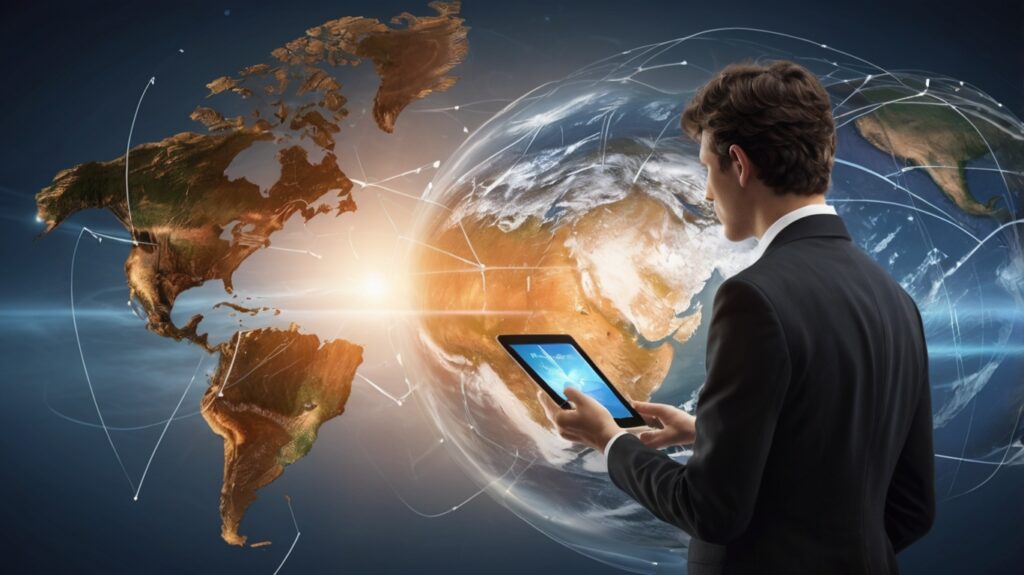Global Tech Trends:
In today’s rapidly evolving digital landscape, technology is not just a tool; it is a force that is reshaping the way we live, work, connect, and envision the future. From artificial intelligence and robotics to green energy and digital currencies, global tech trends are driving societal transformation at a pace and scale never seen before. But what does this mean for the average person, the worker, the student, or the entrepreneur? This article takes a human-centered approach to explore how technological advancements are molding the future across different regions, cultures, and sectors.
The Digital Divide and Global Access
One of the most profound impacts of technology lies in its ability to connect people. However, this connectivity is not evenly distributed. While urban centers in countries like the United States, South Korea, and Germany enjoy high-speed internet and widespread digital literacy, many rural and developing areas still lack basic access. According to a 2023 report by the International Telecommunication Union, about 2.7 billion people globally remain offline.
This digital divide has far-reaching implications. For a child in Nairobi with access to online learning, the opportunities are vastly different from those of a child in a remote village without internet. Bridging this gap is crucial, and efforts are underway. Projects like SpaceX’s Starlink aim to provide satellite internet globally, including to underserved regions. Governments and NGOs are also investing in digital literacy programs, recognizing that true progress means inclusivity.
Artificial Intelligence: Beyond the Buzz
Artificial Intelligence (AI) has moved from the realm of science fiction into daily reality. From voice assistants like Alexa and Siri to more complex systems driving autonomous vehicles and financial algorithms, AI is embedded in our lives. But beyond convenience, AI carries transformative potential for sectors like healthcare, education, and agriculture.
In India, AI-powered diagnostic tools are helping detect diseases like tuberculosis and diabetic retinopathy in rural areas, where doctors are scarce. In Brazil, AI is used to predict crop yields and optimize farming practices, aiding local farmers in decision-making. These developments are not just technological wins; they are life-changing shifts that empower communities and improve well-being.
However, with this power comes responsibility. Ethical concerns about data privacy, surveillance, and algorithmic bias are increasingly part of the global conversation. Nations are developing AI governance frameworks to ensure that innovation does not come at the cost of human rights.

The Green Tech Revolution
Climate change is a global crisis, and technology plays a dual role—both as a contributor and a potential savior. Green technologies, such as renewable energy, electric vehicles (EVs), and carbon capture, are rapidly advancing. Countries are racing to decarbonize their economies while balancing growth and sustainability.
In Norway, over 80% of new car sales are electric, supported by extensive charging infrastructure and government incentives. In Kenya, innovative startups are using solar energy to power schools and small businesses, reducing dependency on fossil fuels. Meanwhile, China leads the world in solar panel production and is heavily investing in wind and hydroelectric power.
These shifts are not just about environmental stewardship; they also signal economic opportunity. The green economy is creating jobs in manufacturing, installation, research, and maintenance—paving the way for a sustainable future.
Remote Work and the Future of Employment
The COVID-19 pandemic accelerated a trend that was already in motion: remote work. As companies scrambled to adapt, millions of workers discovered that physical presence was not a prerequisite for productivity. Today, hybrid and fully remote models are becoming the norm in industries ranging from tech to finance to education.
This shift has profound implications for work-life balance, urban planning, and global talent distribution. A software developer in Lagos can now work for a Silicon Valley startup without ever boarding a plane. This global labor pool fosters diversity and inclusion, allowing companies to tap into a broader range of perspectives and experiences.
However, remote work also presents challenges—from cybersecurity risks to mental health issues. Companies must develop new management strategies and invest in digital infrastructure to ensure long-term success.
Education in the Digital Age
Education is undergoing a renaissance, powered by technology. Online learning platforms, virtual classrooms, and AI-driven tutoring systems are making education more accessible than ever. Platforms like Coursera, Khan Academy, and edX offer courses from top universities to anyone with an internet connection.
In the Philippines, mobile-based learning apps are helping children continue their education despite infrastructure challenges. In Finland, digital tools are integrated into curricula to promote personalized learning. These innovations are leveling the educational playing field, allowing students from different socio-economic backgrounds to access quality resources.
Still, the digitalization of education raises concerns about screen time, data privacy, and the diminishing role of human interaction. A balanced approach is essential to ensure that technology enhances rather than replaces the teacher-student relationship.
Health Tech and Personalized Medicine
Healthcare has seen a seismic shift thanks to technology. Telemedicine, wearable health monitors, and AI-driven diagnostics are making healthcare more proactive and personalized. During the pandemic, telehealth became a lifeline for millions, and its use has continued to grow.
Wearable devices like smartwatches track heart rate, sleep, and activity levels, offering real-time health insights. Genomic sequencing and AI analytics are paving the way for personalized medicine, where treatments are tailored to an individual’s genetic makeup.
In Rwanda, drone delivery services are transporting blood and medical supplies to remote clinics, saving lives in the process. These examples illustrate that tech-enabled healthcare is not a luxury but a necessity in the modern world.
Blockchain and the Financial Frontier
Blockchain technology, best known for powering cryptocurrencies, is redefining financial systems. Beyond Bitcoin and Ethereum, blockchain has applications in supply chain management, digital identity, and secure voting systems.
In El Salvador, Bitcoin has been adopted as legal tender, sparking debates about economic sovereignty and financial inclusion. Meanwhile, countries like Estonia and Singapore are exploring central bank digital currencies (CBDCs) to modernize their financial ecosystems.
Blockchain also holds promise for the unbanked. Over 1.4 billion adults globally do not have access to banking services. Blockchain-based platforms can offer secure, low-cost financial transactions, empowering individuals in underserved communities.
Cultural Shifts and Ethical Considerations
As technology becomes more pervasive, it also influences culture and values. Social media, streaming platforms, and digital art are transforming how we communicate and express ourselves. Yet, they also raise questions about authenticity, mental health, and the monopolization of attention.
Deepfakes, misinformation, and digital addiction are real concerns. The ethical landscape is complex and evolving. Governments, tech companies, and civil society must collaborate to create norms and regulations that protect users while fostering innovation.
The Role of Policy and Governance
Technology does not exist in a vacuum. Its development and deployment are shaped by policies, regulations, and international cooperation. Countries must navigate the delicate balance between encouraging innovation and safeguarding public interests.
Data protection laws like GDPR in Europe and evolving antitrust legislation in the U.S. highlight the growing role of governance in tech. International forums, such as the G20 and the World Economic Forum, are increasingly addressing tech-related issues, from cybersecurity to digital equity.
Collaboration is key. The challenges posed by technology—and the opportunities it offers—are inherently global. Cross-border cooperation, inclusive policymaking, and ethical frameworks will determine whether technology serves humanity or divides it further.
Conclusion: A Shared Future
The story of global technology trends is ultimately a human story. It is about people—their hopes, their struggles, and their dreams. Technology, when guided by empathy, ethics, and equity, can be a powerful tool for progress.
From a rural farmer using AI to improve crop yield to a student in Indonesia accessing world-class education online, technology is unlocking human potential on a scale never before imagined. But with great power comes great responsibility. The choices we make today—as individuals, communities, and nations—will shape the world of tomorrow.
Let us choose wisely, and build a future where technology uplifts, connects, and empowers everyone, everywhere.
Global Tech Trends:
FAQ: Understanding Global Tech Trends and Their Human Impact
1. What is the main focus of this article?
The article explores how emerging technologies are reshaping societies worldwide, with a human-centered lens. It highlights both the opportunities and challenges these changes bring to individuals across different regions, cultures, and professions.
2. How is the digital divide affecting global access to technology?
Despite technological progress, around 2.7 billion people remain offline, mainly in rural or underdeveloped regions. This creates inequality in access to education, work, and information. Projects like Starlink and digital literacy initiatives aim to bridge this gap.
3. What are the real-world impacts of Artificial Intelligence (AI)?
AI is transforming sectors like healthcare, agriculture, and education. For example:
- In India, AI diagnostics help detect diseases in remote areas.
- In Brazil, AI helps farmers predict crop yields.
However, ethical concerns like data privacy and algorithmic bias are growing and being addressed through emerging governance frameworks.
4. What role does technology play in combating climate change?
Green tech innovations such as electric vehicles, solar energy, and carbon capture are helping countries like Norway, Kenya, and China reduce carbon emissions and create green jobs, supporting both environmental and economic goals.
5. How has remote work changed the employment landscape?
The pandemic accelerated remote work, making location less relevant for many jobs. This shift improves access to global employment but also brings challenges such as cybersecurity and employee well-being, requiring new management strategies and digital infrastructure.
6. What advancements are being made in digital education?
Technology is making education more accessible through online platforms like Coursera and Khan Academy. Countries like the Philippines and Finland are using digital tools to overcome infrastructure barriers and personalize learning. However, balance is needed to maintain human interaction and data safety.
7. How is healthcare evolving through technology?
Telemedicine, wearable devices, and personalized medicine are revolutionizing healthcare. Examples include:
- Rwanda’s drone deliveries of medical supplies.
- Wearables tracking health metrics in real time.
These innovations make healthcare more efficient, proactive, and accessible.
8. What is blockchain’s role beyond cryptocurrency?
Blockchain is being used for secure voting, supply chain transparency, and digital identities. It also helps unbanked populations access financial services. Countries like El Salvador and Singapore are experimenting with digital currencies and decentralized finance systems.
9. What cultural and ethical challenges does technology present?
Technology influences culture but also raises issues like misinformation, digital addiction, and loss of privacy. Societies must address these through ethical frameworks, regulation, and public awareness to ensure healthy tech use.
10. Why is policy and governance critical in tech development?
Laws and regulations shape how technology is used and who benefits. Policies like the GDPR and international cooperation (e.g., through G20 and WEF) are crucial in ensuring innovation serves public interest without compromising rights.
11. What is the key takeaway from the article?
Technology is transforming the world in unprecedented ways. While it offers immense potential to improve lives, it must be guided by empathy, ethics, and inclusive governance. The decisions made today will define our shared future.




